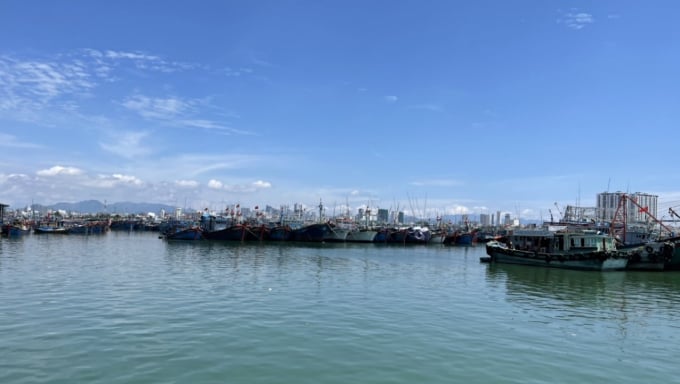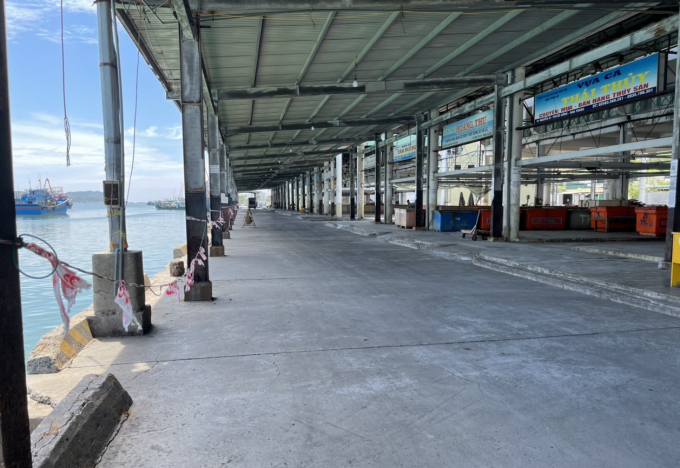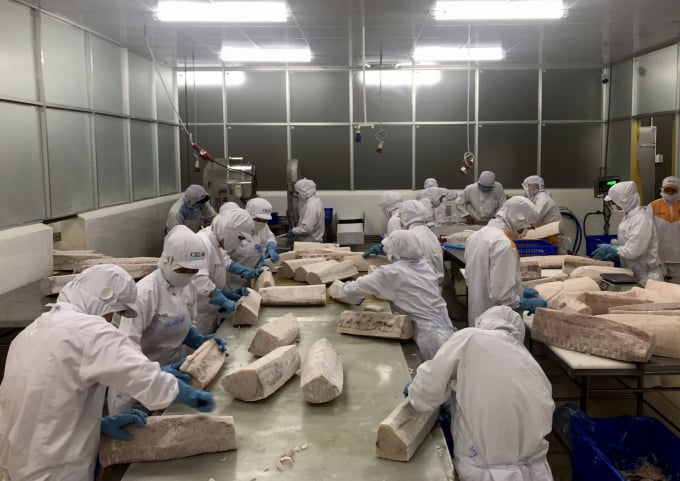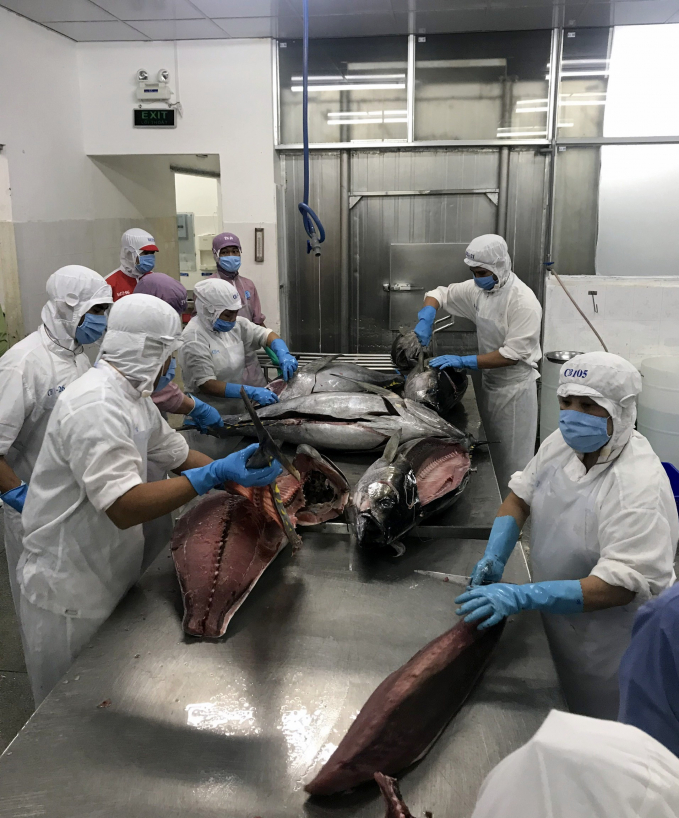May 18, 2025 | 23:42 GMT +7
May 18, 2025 | 23:42 GMT +7
Hotline: 0913.378.918
May 18, 2025 | 23:42 GMT +7
Hotline: 0913.378.918
For the last two months, fisherman Le Van Teo, of Phuong Huan Ward, Nha Trang City has suspended his five offshore fishing boats as the city implemented social distancing measures.

Offshore fishing boats stay at Hon Ro Port in Khanh Hoa Province during social distancing. Photo: KS.
Teo said that due to suspended fishing boats, many fishermen had no income.
Boat owners like him faced more difficulties because they had to pay debts and lend fishermen some money, he said.
“If boat owners don’t help their workers now, it will be difficult for them to hire workers after the pandemic,” he said.
Mai Thanh Phuc, president of Phuoc Dong Fishing Union in Nha Trang City said that 32 boats of the union members had not reached the sea for the last few months.
The union’s non-contracted workers had been applying to get the Government’s supports which was designed for workers affected by the COVID-19.
“What we want most now is that the pandemic is under control and we could resume working, especially when tuna fishing season is set to come,” he said.
Lu Thanh Phong, head of the Marine Resources Development and Exploitation Department under the Khanh Hoa Province Aquaculture Department said that out of 746 offshore fishing boats in the province, only 40-80 boats were still working at this time.

Hon Ro Fishing Port was closed to meet COVID-19 prevention and control requirements. Photo: KS.
In the first eight months of this year, the province’s fishing production was about 56,560 tonnes, a decline of 6.7 per cent compared with that of the same period last year.
To follow COVID-19 prevention and control requirements, Hon Ro Fishing Port in Nha Trang City was closed while it was the only port to certify the origin of aquaculture products in the province per the decision of the Ministry of Agriculture and Rural Development. Thus, seafood enterprises had to stop purchasing input materials there.
As Hon Ro Fishing Port was closed, offshore fishing boats were instructed to go to other fishing ports to unload their fish.
A representative from a seafood company said that when purchasing fish at Da Bac Fishing Port in Cam Ranh City, they still paid VND 110,000 -120,000 for a kg of ocean tune but prices of other fish were all 20-30 per cent lower than normal.
Meanwhile, boat owners complained that costs for offshore fishing increased 15-25 per cent. Many boat owners fail to afford the cost, so they opted to stop fishing, stay at ports or intend to sell the boats.
As a result, the fish purchasing of enterprises and domestic consumption were also affected.
Nguyen Trung Hieu, head of Hon Ro Fishing Port Management Board said that up to 200 fishing boats in Khanh Hoa District could not go fishing offshore because of social distancing measures during the COVID-19 pandemic.
In Khanh Hoa Province, there are 149 aquaculture processing units for consumption at domestic markets and 57 processing units that meet standards for export.

Many seafood processing plants in Khanh Hoa Province stopped operation due to a shortage of input materials. Photo: ĐT.
Nguyen Trong Chanh, head of Khanh Hoa Province’s Aquaculture Production Department said that many local processing plants stopped operation because of the shortage of input materials.
Moreover, their production costs increased as they followed disease prevention and control measures like the three on-site models that the employees arranged stays for workers at the workplace.
In addition, some enterprises don’t have enough workers.
Huynh Dac Tri, director of Nha Trang T&H Ltd Company said that seafood processing companies were badly affected by the disrupted supply chain when fishing boats failed to reach the sea for fishing.
Moreover, freight rates for shipping goods also increased sharply. Previously, shipping a container to Europe and the US cost about $2,000-2,500. Now, it increased to $12,000-13,000.
“Currently, seafood exports to the US and Europe are still stable. Customers placed a lot of orders, but seafood processing enterprises had to stop working and did not have enough materials to deliver. As far as I know, about 70-80% of plants in the Industrial Park in Suoi Dau are temporarily suspending their operation, "said Tri.

Tuna processing at Nha Trang T&H Ltd Company. Photo: DT.
Nguyen Trong Chanh, head of Khanh Hoa Province’s Aquaculture Production Department said that to solve the problems, it was necessary to vaccinate workers in the aquaculture industry to ensure safe value chains.
Moreover, enterprises need the Government to create further conditions to facilitate the transportation, circulation of goods and offer financial supports so that enterprises could resume production.
Đối với tỉnh Khánh Hòa, cần sớm xem xét có phương án phù hợp để các cảng cá và các doanh nghiệp (chế biến, thu mua…) sớm trở lại hoạt động sản xuất.
Phu Yen making efforts to keep the aquaculture supply chain
According to Phu Yen Province’s Department of Agriculture and Rural Development, the province has 655 offshore fishing boats. Nearly half of the boats go fishing offshore regularly while the others are under maintenance to prepare for the next fishing season.
Despite the COVID-19, fishing boats in Phu Yen still head to the sea. This year, Phu Yen fishermen got a bumper catch of Pompano. Local fishermen reportedly caught nearly 3,700 tonnes of seafood.
Nguyen Tri Phuong, director of the agriculture department said that to maintain seafood supply chains, forces including border guards, police and local authorities joined to keep local ports COVID-free areas.
People working at the fishing ports, drivers and fishermen are tested for SARS-CoV-2 and vaccinated against the COVID-19. So, during the pandemic, Phu Yen fishermen continue to go fishing offshore, ensure seafood supply in the coming time.
As a long-term solution, the province would call on enterprises to invest in cold storage at fishing ports and processing plants, so in incidents like the COVID-19 pandemic, the supply still will be ensured to meet the demand of domestic consumption and export.
Translated by Hien Anh

(VAN) 14 out of 35 domesticated elephants in Dak Lak province have had their living conditions improved, with 11 of them currently participating in the non-riding elephant tourism model.

(VAN) Muong Nhe Nature Reserve hopes that being upgraded to a national park will lay the foundation for forest protection efforts to be carried out in a systematic, modern, and sustainable manner.
/2025/05/16/3923-2-171845_52.jpg)
(VAN) Lower costs, higher yields, and improved soil quality are outstanding benefits that soybeans bring when integrated into the crop rotation system.

(VAN) The 'For a Green National Environment' programme aims to promote a green lifestyle, support businesses in implementing ESG practices, and turn Net Zero commitments into concrete actions.

(VAN) Cold-barn systems efficiently manage environmental and temperature conditions, which aids in the prevention of respiratory diseases in pigs and protects them from the vectors that transmit African swine fevers.

(VAN) To tackle challenges, the project 'Addressing key technical bottlenecks in the grouper supply chain in Vietnam' has been underway since 2024.

(VAN) The project 'Disease-Resilient and Sustainable Cassava Production Systems in the Mekong Region', funded by the Australian Center for International Agricultural Research (ACIAR), is being implemented from 2024 to 2028.